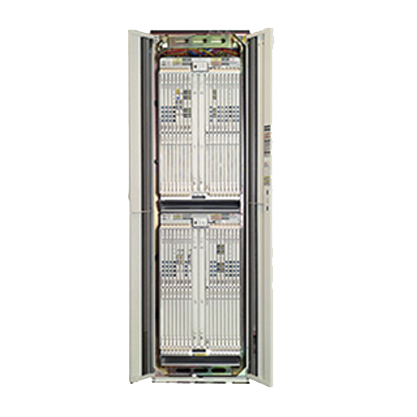
Home » Alcatel Lucent » Alcatel 1600 Series » Alcatel 1675
The Alcatel‑Lucent 1675 LambdaUnite MultiService Switch (MSS) is a next-generation optical switching platform designed to unify high-speed SDH/SONET transport, service aggregation, and packet-aware adaptation within a single, high-density shelf. Tailored for metro and backbone networks, it offers flexibility to support ring or mesh topologies while remaining cost-effective and easy to manage.
Available in switching capacities of 160 Gbps, 320 Gbps, and 640 Gbps per shelf, the LambdaUnite platform delivers ultra-high-density connectivity—capable of supporting colored OC‑48/STM‑16 or OC‑192/STM‑64 interfaces, while reducing equipment footprint and power consumption. Its “any card in any slot” architecture allows expansion port modules to be inserted in service, enabling in-service upgrades without network disruption.
LambdaUnite excels in converged transport environments, offering a powerful grooming matrix capable of handling STS‑1/VC‑4 and VT‑1.5/VC‑12 levels, coupled with TransLAN or ISA module support for efficient adaptation of services such as Gigabit Ethernet over SDH. This fully converged architecture streamlines infrastructure, lowers costs, and maximizes fiber utilization.
Designed for high availability, the 1675 MSS supports a broad range of industry-standard protection schemes, including MS-SPRing/BLSR, SNCP/UPSR, dual-node interworking, linear MSP, and mesh-based restoration—ensuring seamless resilience in both ring and mesh topologies.
Management is centralized via the Navis Optical Management System, which provides point‑and‑click provisioning, comprehensive SLA, and performance tools across the broader Alcatel‑Lucent optical portfolio. The platform’s global SDH/SONET compliance ensures interoperability in multi-vendor environments and supports rapid deployment of Ethernet-based services.
Scalable Switching Capacity
Available in 160 Gbps, 320 Gbps, and 640 Gbps configurations per shelf to meet the needs of growing metro and core transport networks.
Flexible Service Aggregation
Supports SDH/SONET, Ethernet, Fibre Channel, and other data services across a unified transport infrastructure.
High-Density Optical Interfaces
Supports OC-48/STM-16 and OC-192/STM-64 interfaces, with native colored optics for direct integration into DWDM systems.
Any Card in Any Slot Architecture
Modular design allows hot-swappable, in-service addition of cards and modules without interrupting live traffic.
Advanced Grooming Matrix
Handles grooming at STS-1/VC-4 and VT-1.5/VC-12 levels for optimized bandwidth use and service efficiency.
Carrier-Class Protection Schemes
Supports MS-SPRing, SNCP, UPSR, linear MSP, and mesh restoration for maximum service continuity.
Ethernet over SDH/SONET
Integrated TransLAN and ISA modules support Ethernet encapsulation via GFP, VCAT, and LCAS for modern data service delivery.
DWDM Compatibility
Ready for integration with dense wavelength-division multiplexing systems, reducing the need for external optical transport gear.
Global Interoperability
Complies with international SDH/SONET standards, making it suitable for multi-vendor environments and international deployments.
Centralized Network Management
Fully managed via the Navis Optical Management System for efficient provisioning, monitoring, and SLA performance tracking.
The Alcatel 1675 LambdaUnite MSS is a high-capacity optical multiservice switch designed for deployment in metro core, regional, and long-haul networks. It supports switching capacities of 160 Gbps, 320 Gbps, or 640 Gbps per shelf, and is capable of operating in ring, mesh, or hybrid topologies. The platform supports SDH/SONET transport with optical interfaces up to OC-192/STM-64, including colored optics for direct integration into DWDM systems.
Its modular, “any card in any slot” architecture allows flexible configuration and easy in-service upgrades, minimizing operational disruption. The system can groom traffic at both high-order (STS-1/VC-4) and low-order (VT-1.5/VC-12) levels, enabling efficient bandwidth management and service delivery. Each shelf supports a wide mix of interface modules, including Gigabit Ethernet, Fast Ethernet, OC-3/12/48/192, STM-1/4/16/64, Fibre Channel, and ESCON.
The platform includes TransLAN and Integrated Service Adapter (ISA) modules to adapt Ethernet services over SDH/SONET using GFP (Generic Framing Procedure), VCAT (Virtual Concatenation), and LCAS (Link Capacity Adjustment Scheme). These features allow operators to offer dynamic, bandwidth-efficient Ethernet services without sacrificing legacy support.
For reliability, the 1675 MSS includes a full suite of protection mechanisms such as MSP 1+1, SNCP/UPSR, dual-node interworking, and mesh-based restoration. Synchronization is supported through internal and external timing sources, with full SSM (Synchronization Status Messaging) compliance to maintain timing accuracy across the network.
Power input is typically -48V DC with redundant power supply support. The system is rack-mountable in standard 19” or 23” ETSI-compliant racks and supports both front and rear access options. Environmental tolerances meet telecom-grade standards for controlled environments.
Management is centralized through the Navis Optical Management System, offering a comprehensive GUI-based platform for provisioning, performance monitoring, alarm management, and SLA tracking across multi-site deployments. The 1675 MSS is fully interoperable with other Alcatel-Lucent optical systems and standards-compliant for integration in multi-vendor environments.
| Period | Owner / Marketer | Notes |
|---|---|---|
| Mid‑2000s – 2006 | Alcatel | Initial development and release of the 1675 LambdaUnite platform, designed as a high-capacity optical multi-service switch supporting STM‑16/64 and Ethernet services. |
| 2006 – 2016 | Alcatel‑Lucent | Product continued under Alcatel-Lucent after the merger; platform advanced with Release 10.x software, supporting up to 640 Gbps configurations in ring and mesh networks. |
| 2016 – Present | Nokia | With Nokia’s acquisition of Alcatel‑Lucent in 2016, the 1675 entered Nokia’s legacy portfolio, with support, documentation, and spares maintained under Nokia branding. |
No files found.
From expert maintenance and repair to reliable part sourcing and technical consultation, we provide comprehensive support for every stage of your network’s lifecycle. Whether you’re extending the life of legacy systems or integrating with modern infrastructure, our team ensures seamless, efficient, and cost-effective solutions—so you can focus on performance, not problems.